By Maria Kidner, Lander Rotary Club
(Maria Kidner (right in photo) is a doctoral prepared nurse practitioner with 18 years’ experience in cardiology. She has worked in Rwanda since 2014. In 2020, Team Heart, a non-profit organization providing free valve replacements for patients with Rheumatic Heart Disease while also training cardiac surgeons, asked her to design and oversee the first post-mastered nursing cardiology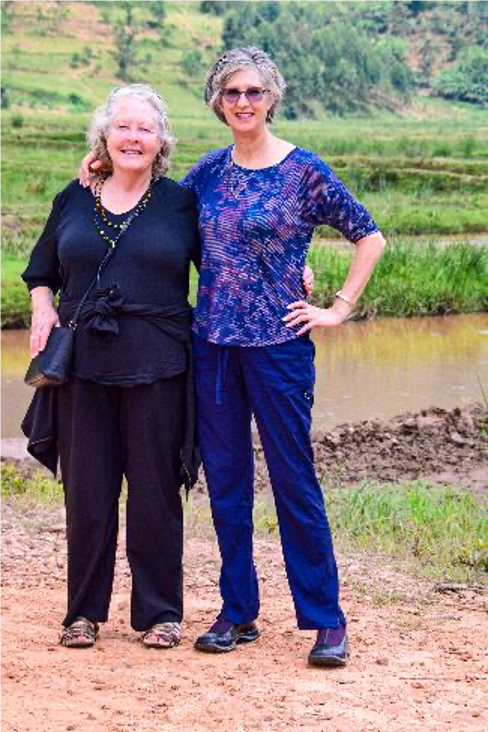 course in Rwanda. This led to the 2023 nurse conference described in Maria’s letter below.)
course in Rwanda. This led to the 2023 nurse conference described in Maria’s letter below.)
 course in Rwanda. This led to the 2023 nurse conference described in Maria’s letter below.)
course in Rwanda. This led to the 2023 nurse conference described in Maria’s letter below.)This is a story of how I was able to make a dream come true.
In 2014, while living temporarily in Rwanda, I learned about the devastation of Rheumatic Heart Disease, which has its start in untreated cases of strep throat. I knew that teaching a clinical diagnosis for strep throat and the proper way to treat strep throat could save lives. Yet I quickly found out that to develop and implement an educational training on a scale to make a true difference is difficult and expensive.
Fast forward to 2020: I was asked if I would build an educational program for nurses to gain cardiology skills. That ask grew into the Specialized Cardiac Nurse program for Rwanda. This extensive training program provided graduate level education for six nurses...but not on a scale to make a difference. Then, at District 5440’s District Conference in 2022 in Lander, I was inspired by others presenting their service projects, and I suddenly realized that Rotary could help make my dream come true.
In August 2022 I started working with my students to develop a nurse-developed, nurse-given Rheumatic Heart Disease conference for the nurses in the remote locations of Rwanda who provide direct care to their communities. We went through an Institutional Review Board for research and developed a full research protocol to analyze our presentations to ensure a sustaining program could be built. With Rotarians’ and others’ donations, we raised enough money to cover a conference for 30 participants, providing each participant with a stethoscope, manual, water bottle, pen and a highlighter.
I arrive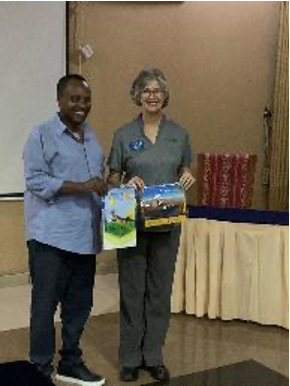 d in Rwanda on February 9, 2023. After some negotiations, the Rwandan Biomedical Board (RBC), the country’s oversight board for all healthcare activities, approved our project, after initially denying approval. We convinced the Board that the University of Rwanda was directly involved since three of my students are faculty and the primary investigator was Dr. Madeleine (a good friend to the RBC).
d in Rwanda on February 9, 2023. After some negotiations, the Rwandan Biomedical Board (RBC), the country’s oversight board for all healthcare activities, approved our project, after initially denying approval. We convinced the Board that the University of Rwanda was directly involved since three of my students are faculty and the primary investigator was Dr. Madeleine (a good friend to the RBC).
 d in Rwanda on February 9, 2023. After some negotiations, the Rwandan Biomedical Board (RBC), the country’s oversight board for all healthcare activities, approved our project, after initially denying approval. We convinced the Board that the University of Rwanda was directly involved since three of my students are faculty and the primary investigator was Dr. Madeleine (a good friend to the RBC).
d in Rwanda on February 9, 2023. After some negotiations, the Rwandan Biomedical Board (RBC), the country’s oversight board for all healthcare activities, approved our project, after initially denying approval. We convinced the Board that the University of Rwanda was directly involved since three of my students are faculty and the primary investigator was Dr. Madeleine (a good friend to the RBC).That first night, I was asked to present to the Rotary Club of Kigali. After my presentation, the club members unanimously agreed to become our sister club in a Global grant to build a sustainable team and process to reach all nurses working in the remote areas of Rwanda. What a thrill and overwhelming sense of gratitude I have towards the Rotary Club of Kigali!
Day One
At this early point, we had no idea who had been invited to the conference or who could come on one day’s notice, as our proposed participants lived in very remote areas. Friday morning (Feb. 10) arrived and was beyond my wildest dreams -- by the start time of 10 AM there were 25 nurses and by 11:30 AM there were 31 nurses from remote western provinces eager to learn about Rheumatic Heart Disease!
Our next hurdle was what l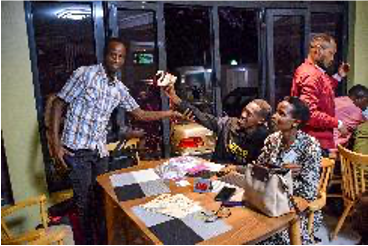 anguage to use for the instruction. We belatedly realized that many of these nurses were trained in the Congo in French. We pivoted and I had my students present in Kinyarwanda, French, and English! Kinyarwanda does not have words for medical terms and thus the other languages were needed. I cannot express the joy and amazement I had with how incredibly engaged the nurses were and how well my six students presented their topics.
anguage to use for the instruction. We belatedly realized that many of these nurses were trained in the Congo in French. We pivoted and I had my students present in Kinyarwanda, French, and English! Kinyarwanda does not have words for medical terms and thus the other languages were needed. I cannot express the joy and amazement I had with how incredibly engaged the nurses were and how well my six students presented their topics.
 anguage to use for the instruction. We belatedly realized that many of these nurses were trained in the Congo in French. We pivoted and I had my students present in Kinyarwanda, French, and English! Kinyarwanda does not have words for medical terms and thus the other languages were needed. I cannot express the joy and amazement I had with how incredibly engaged the nurses were and how well my six students presented their topics.
anguage to use for the instruction. We belatedly realized that many of these nurses were trained in the Congo in French. We pivoted and I had my students present in Kinyarwanda, French, and English! Kinyarwanda does not have words for medical terms and thus the other languages were needed. I cannot express the joy and amazement I had with how incredibly engaged the nurses were and how well my six students presented their topics.We had a working dinner where I did the “swan project.” I had a 3D wooden puzzle of a swan. I then split the puzzle into 5 parts: the history and physical, lab and data, differential diagnosis, diagnosis, and treatment plans. As they built the swan, they discussed their “patient.” Once completed I shared (through an interpreter) the story of the Ugly Duckling, which – you may be surprised to learn – is about lateral and vertical abuse. We then talked about the importance of nurses using a stethoscope.
Day Two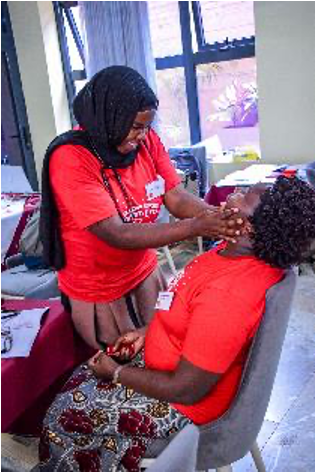

Day two started early at 8:30… and again the room was full of those 31 eager nurses. This is the first event I have put on that the participants attended 100% of the activity. Day Two was about providing skills on assessing a patient. These nurses are responsible for identifying heart disease and heart failure--yet have never used a stethoscope! To provide these nurses with basic skills to make a difference every day, we provided education on the HEENT (head-eye-ears-neck), Respiratory, cardiac, and abdominal systems. And we gave them stethoscopes!! These scopes were donated by Dr. Kevin Courville and Pulsario. I wrapped them in red paper (representing swollen tonsils) with white polka dots (for pus). The thrill and joy were palpable with the unwrapping of their very own stethoscopes!! So exciting. The goal was to teach normal versus abnormal conditions and to refer all abnormal conditions to the District hospital.
We had models, incl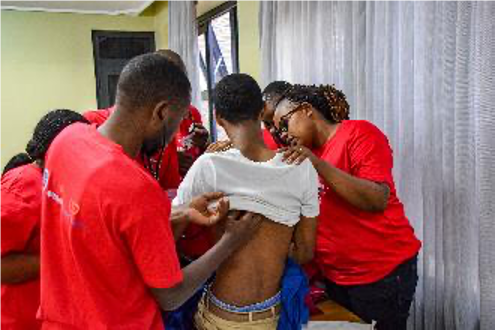 uding a 22-year-old man with a severe Aortic Stenosis murmur (and on the surgical list for replacement). The day went by fast and was full of smiles and wonder as the nurses actually heard the beat of a heart for the first time.
uding a 22-year-old man with a severe Aortic Stenosis murmur (and on the surgical list for replacement). The day went by fast and was full of smiles and wonder as the nurses actually heard the beat of a heart for the first time.
 uding a 22-year-old man with a severe Aortic Stenosis murmur (and on the surgical list for replacement). The day went by fast and was full of smiles and wonder as the nurses actually heard the beat of a heart for the first time.
uding a 22-year-old man with a severe Aortic Stenosis murmur (and on the surgical list for replacement). The day went by fast and was full of smiles and wonder as the nurses actually heard the beat of a heart for the first time. In addition to all of these activities, our participants agreed to the resting process and completed pre-tests, post-tests, and course evaluations. Wow!! What a whirlwind and huge success! None of this would have happened without the generous donations of Rotarians and others. Thank you, thank you!

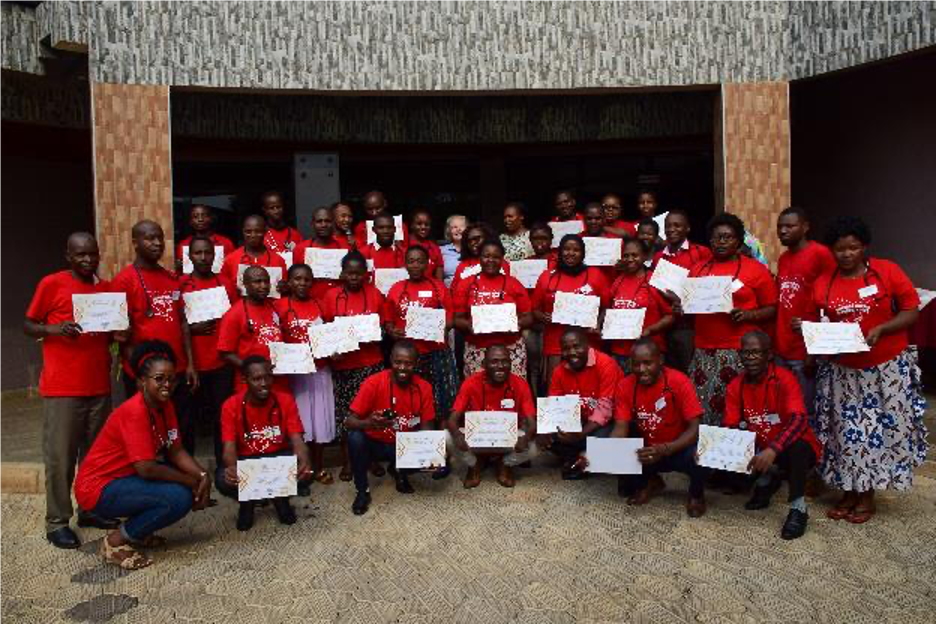
What’s next? Well, it is my hope that we can proceed to a Global Grant. Plus, after the conference, I went to the remotest hospital in the country, Kaduha District hospital. This is the prosed next teaching site. Julie Carragher is a nurse practitioner who has been a part of Team Heart’s surgical group for many years. She in now in her doctoral program and has chosen as her topic to review the course and build a team to start a sustainable delivery system. So we have much work to do with data collection, course review, working with RBC, the University of Rwanda, Rotary, and determining who needs to be trained in a train-the-trainer. But everything is possible when Service is above Self!
